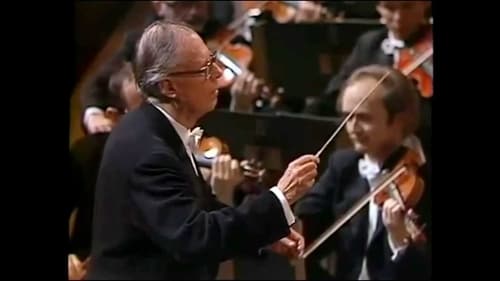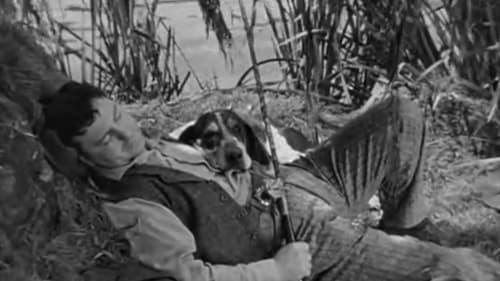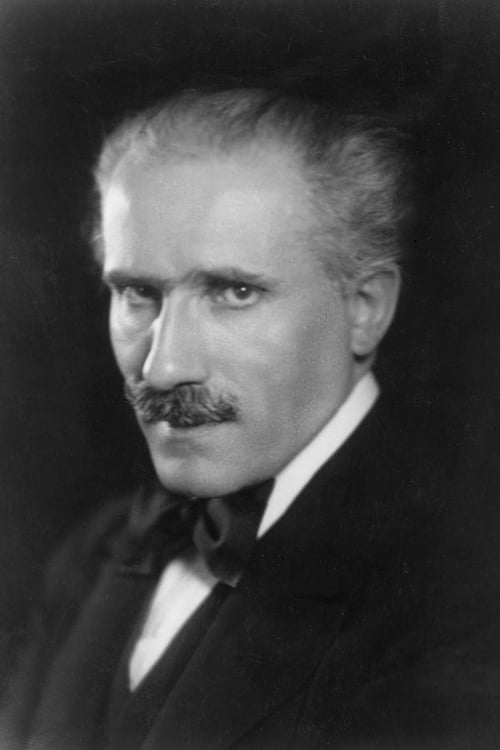Arturo Toscanini
Nascimento : 1897-03-25, Parma, Emilia-Romagna, Italy
Morte : 1957-01-16
História
Arturo Toscanini (March 25, 1867 – January 16, 1957) was an Italian conductor. He was one of the most acclaimed and influential musicians of the late 19th and early 20th century, renowned for his intensity, his perfectionism, his ear for orchestral detail and sonority, and his eidetic memory. He was at various times the music director of La Scala in Milan and the New York Philharmonic. Later in his career he was appointed the first music director of the NBC Symphony Orchestra (1937–54), and this led to his becoming a household name (especially in the United States) through his radio and television broadcasts and many recordings of the operatic and symphonic repertoire.

Self (archive footage)
Documentary about sixteen great conductors of the 20th century.

Conductor (self)
The historic Toscanini television concerts with the NBC Symphony Orchestra. Broadcast #9 was of a concert on March 22, 1952, at Carnegie Hall, featuring Beethoven's 5th Symphony and Respighi's Pines of Rome. (Concerts #8 and #9 were released on "Vol. 5" in the DVD series.)

Self, Conductor
The historic Toscanini television concerts with the NBC Symphony Orchestra. Broadcast #8 was of a concert on March 15, 1952, at Carnegie Hall, featuring Sibelius's En Saga, two of Debussy's Nocturnes, and Franck's Redemption. (Concerts #8 and #9 were released on "Vol. 5" in the DVD series.)

Conductor (self)
The historic Toscanini television concerts with the NBC Symphony Orchestra. Broadcast #7 was of a concert on December 29, 1951 from Carnegie Hall, featuring music from Wagner's operas. (Concerts #6 and #7 were released as "Vol. 4" in the DVD series.)

Conductor (self)
The historic Toscanini television concerts with the NBC Symphony Orchestra. Broadcast #6 was of a concert on November 3, 1951 from Carnegie Hall, featuring the Overture to Carl Maria von Weber's Euryanthe and Brahms's Symphony No. 1 in C minor op68. (Concerts #6 and #7 were released as "Vol. 4" in the DVD series.)

Conductor (self)
The historic Toscanini television concerts with the NBC Symphony Orchestra. This concert, broadcast in two parts, on 26 March and 2 April 1949, from NBC Studio 8H, features the opera "Aida" by Giuseppe Verdi. (Both broadcasts were released as "Vol. 3" in the DVD series.)

Conductor (self)
The historic Toscanini television concerts with the NBC Symphony Orchestra. Broadcast #3 was of a concert on December 4, 1948, at NBC Studio 8H, featuring Mozart's Symphony No. 40 in G minor K550; Dvorak's Symphonic Variations op78; and Wagner's Overture to Tannhäuser. (Concerts #3 and #4 were released on "Vol. 2" in the DVD series.)

Conductor (self)
The historic Toscanini television concerts with the NBC Symphony Orchestra. Broadcast #3 was of a concert on November 13, 1948, at NBC Studio 8H, featuring Brahms's Concerto for Violin, Cello & Orchestra, A minor op102; Liebeslieder-Walzer op52; and the Hungarian Dance #1 in G minor. (Concerts #3 and #4 were released on "Vol. 2" in the DVD series.)

Conductor (self)
The historic Toscanini television concerts with the NBC Symphony Orchestra. Broadcast #1 was of a concert on April 3, 1948, at NBC Studio 8H, featuring Beethoven's Symphony No. 9 ("Choral"). (Concerts #1 and #2 were released on "Vol. 1" in the DVD series.)

Conductor (self)
The historic Toscanini television concerts with the NBC Symphony Orchestra. Broadcast #1 was of a concert on March 20, 1948, at NBC Studio 8H, featuring orchestral music from Wagner's operas. (Concerts #1 and #2 were released on "Vol. 1" in the DVD series.)

Conductor
To hear is not the same as seeing and hearing! To watch Maestro Toscanini conduct this opera is a revelation. This man is a direct link to Verdi, Puccini and other great opera composers. He did the premier performances of many major operas. His tempos, phrasing, etc. must be considered definitive. I was mesmerized from start to finish. One will forget the soft black and white, and sometimes blurred images, the lack of subtitles, and the relatively limited sound frequency range, as the focus will be on what Toscanini is doing on the podium. Richard Tucker -- what can I say about Mr. Tucker? His performance was wonderful, clear, nuanced.

Arturo Toscanini - Orchestra Conductor
A documentary about the 82% of US citizens that listen to the radio for their entertainment, news and sport.

Self (uncredited)
The history of a Polish family and its contributions to the war effort throughout American history.

Himself
Hymn of the Nations, originally titled Arturo Toscanini: Hymn of the Nations, is a 1944 film directed by Alexander Hammid, which features the "Inno delle nazioni," a patriotic work for tenor soloist, chorus, and orchestra, composed by Italian opera composer Giuseppe Verdi in the early 1860s. (For this musical work, Verdi utilized the national anthems of several European nations.) In December 1943, Arturo Toscanini filmed a performance of this music for inclusion in an Office of War Information documentary about the role of Italian-Americans in aiding the Allies during World War II. Toscanini added a bridge passage to include arrangements of "The Star-Spangled Banner" for the United States and "The Internationale" for the Soviet Union and the Italian partisans. Joining Toscanini in the filmed performance in NBC Studio 8-H, were tenor Jan Peerce, the Westminster Choir, and the NBC Symphony Orchestra. The film also included the overture to Verdi's opera La Forza del Destino.

Original Music Composer
The young hero, Frederick, is leaving his country home and going to the city to attend the bull fight, and while there he meets and woos a beautiful maiden, forgetting his own little sweetheart at home.







